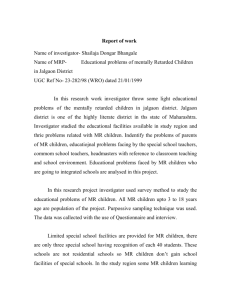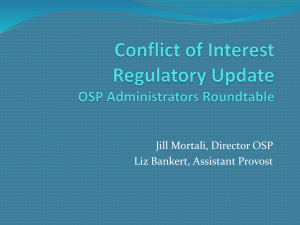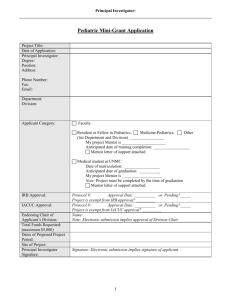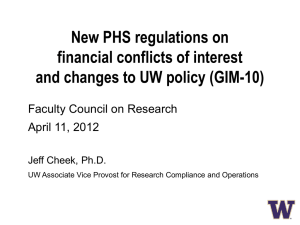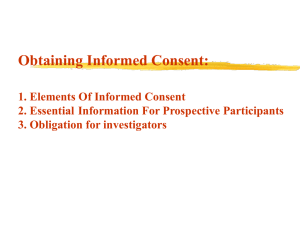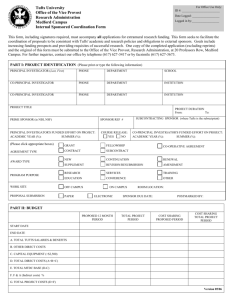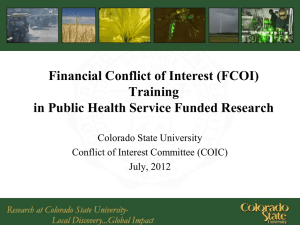CWRU COI Procedures - Case Western Reserve University
advertisement
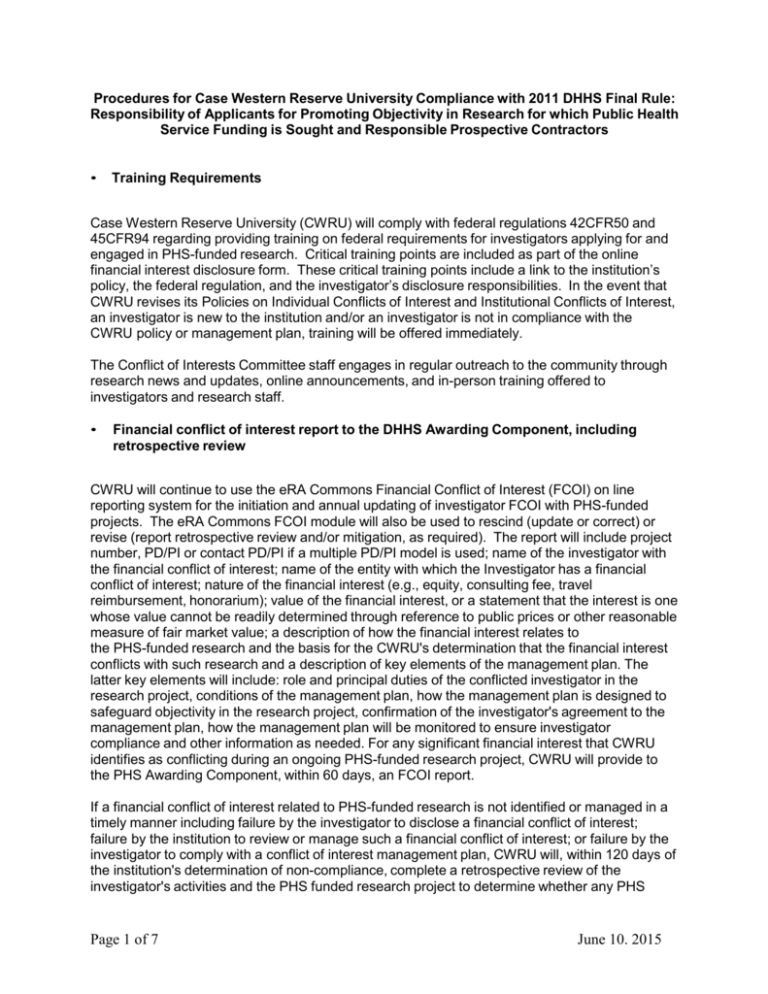
Procedures for Case Western Reserve University Compliance with 2011 DHHS Final Rule: Responsibility of Applicants for Promoting Objectivity in Research for which Public Health Service Funding is Sought and Responsible Prospective Contractors • Training Requirements Case Western Reserve University (CWRU) will comply with federal regulations 42CFR50 and 45CFR94 regarding providing training on federal requirements for investigators applying for and engaged in PHS-funded research. Critical training points are included as part of the online financial interest disclosure form. These critical training points include a link to the institution’s policy, the federal regulation, and the investigator’s disclosure responsibilities. In the event that CWRU revises its Policies on Individual Conflicts of Interest and Institutional Conflicts of Interest, an investigator is new to the institution and/or an investigator is not in compliance with the CWRU policy or management plan, training will be offered immediately. The Conflict of Interests Committee staff engages in regular outreach to the community through research news and updates, online announcements, and in-person training offered to investigators and research staff. • Financial conflict of interest report to the DHHS Awarding Component, including retrospective review CWRU will continue to use the eRA Commons Financial Conflict of Interest (FCOI) on line reporting system for the initiation and annual updating of investigator FCOI with PHS-funded projects. The eRA Commons FCOI module will also be used to rescind (update or correct) or revise (report retrospective review and/or mitigation, as required). The report will include project number, PD/PI or contact PD/PI if a multiple PD/PI model is used; name of the investigator with the financial conflict of interest; name of the entity with which the Investigator has a financial conflict of interest; nature of the financial interest (e.g., equity, consulting fee, travel reimbursement, honorarium); value of the financial interest, or a statement that the interest is one whose value cannot be readily determined through reference to public prices or other reasonable measure of fair market value; a description of how the financial interest relates to the PHS-funded research and the basis for the CWRU's determination that the financial interest conflicts with such research and a description of key elements of the management plan. The latter key elements will include: role and principal duties of the conflicted investigator in the research project, conditions of the management plan, how the management plan is designed to safeguard objectivity in the research project, confirmation of the investigator's agreement to the management plan, how the management plan will be monitored to ensure investigator compliance and other information as needed. For any significant financial interest that CWRU identifies as conflicting during an ongoing PHS-funded research project, CWRU will provide to the PHS Awarding Component, within 60 days, an FCOI report. If a financial conflict of interest related to PHS-funded research is not identified or managed in a timely manner including failure by the investigator to disclose a financial conflict of interest; failure by the institution to review or manage such a financial conflict of interest; or failure by the investigator to comply with a conflict of interest management plan, CWRU will, within 120 days of the institution's determination of non-compliance, complete a retrospective review of the investigator's activities and the PHS funded research project to determine whether any PHS Page 1 of 7 June 10. 2015 funded research, or portion thereof, conducted during the time period of the non-compliance, was biased in the design, conduct or reporting of such research. The institution is required to document the retrospective review. Based on the results of the retrospective review, if appropriate, CWRU will update the previously submitted FCOI report, specifying the actions that will be taken to manage the conflict of interest going forward. If bias is found, the institution is required to notify the PHS awarding component promptly and submit a mitigation report to the PHS Awarding Component. • Details on Travel Expense Disclosure For recipients of PHS awards, disclosure of travel expenses and reimbursement is required for travel that is not reimbursed or sponsored by a federal, state, or local government agency, an institution of higher education as defined at 20 U.S.C. 1001(a), an academic teaching hospital, a medical center, or a research institute that is affiliated with an institution of higher education. Disclosure of the nature of the travel will be accomplished on the annual disclosure form. Disclosure is required of the duration/ date(s) of the trip (s), the purpose(s) of the trip(s), the identity(ies) of the sponsor/organizer, and the destination(s). The Conflict of Interests Committee may require additional information not captured on the formal request, including an estimate of monetary value, in order to determine whether the travel may constitute a financial conflict of interest with PHS funded research. • Disclosure Procedure Details Whenever, in the course of an ongoing PHS-funded research project, an investigator who is new to participating in the research project discloses a significant financial interest or an existing investigator discloses a new significant financial interest to the Institution, the Conflict of Interests Committee of CWRU, within sixty days: review the disclosure of the significant financial interest; determine whether it is related to PHS-funded research; determine whether a financial conflict of interest exists; and, if so, implement, on at least an interim basis, a management plan that shall specify the actions that have been, and will be, taken to manage such financial conflict of interest. Depending on the nature of the significant financial interest, CWRU may determine that additional interim measures are necessary with regard to the Investigator's participation in the PHS-funded research project between the date of disclosure and the completion of the Institution's review. CWRU will develop and implement a management plan within 60 days after disclosure for an individual new to a research project; CWRU has implemented a process to capture disclosure within 60 days between hire and disclosure implied by "new to participating in the research." The information disclosed on individual conflict of interest forms is used in carrying out the institutional conflict of interest policy. Approved management plans are distributed as required/applicable, to IRBs (CWRU, UH, CCF, MH & VA), IBC, IACUC, and UH Harmonization representatives. Approved management plans can include stipulations on an individual’s role in the consent process which cannot be weakened by an IRB, although IRB can require more stringent conditions. • Monitoring of Management Plans The CWRU Conflict of Interests Committee (COIC) monitors management plans on a routine basis. Monitoring ensures that the requirements of the plan are understood and followed, and Page 2 of 7 June 10. 2015 to assist the faculty, staff member, or student in implementing the plan. The COIC ensures the monitoring of management plans by reviewing the following: Annual Outside Financial Interests Disclosure Certifications Proposals and awarded projects Management plan stipulations • Financial Interest Related to the Research “Financial Interest Related to the Research” means financial interest in the sponsor, product or service being tested. • Significant Financial Interest In a research context, Significant Financial Interest (SFI) means one or more of the following financial interests of the Investigator (and those of the Investigator's spouse and dependent children, domestic partner or anyone else living in the same household), that reasonably appears to be related to the Investigator's institutional responsibilities. Note: When outside financial interests for the same outside entity or source are reported for one or more of the categories listed below, the information will be reviewed in aggregate for significance. a. Remuneration - When aggregated, salary and any payment for services not otherwise identified as salary, e.g., consulting fees, honoraria, paid authorship-- received from any single entity or source in the 12 month disclosure period is equal to or greater than $5000. b. Equity - The value as of the date of disclosure of: 1) Equity (stock, stock option or other ownership interest, as determined through reference to public prices or other reasonable measures of fair market value) in a publicly traded entity is equal to or greater than $5000. 2) Equity in a non-publicly traded entity of any amount. c. Intellectual Property - Intellectual property rights and interests, including licensing and option agreement fees, except intellectual property rights assigned to the employing institution and agreements to share in royalties related to such rights. d. Officer status - Board membership or other officer position involving advisory or fiduciary duties with an outside entity where: 1) the individual receives compensation from the entity (i.e., salary or other remuneration; equity interest, such as stock, stock options or other ownership interest; or other compensation of monetary value); or 2) the board or officer position (whether compensated or uncompensated) is with a for-profit outside entity or with an outside entity (for-profit or non-profit) that has a vendor or sponsor relationship with the University or its clinical affiliates, to the best of the individual's knowledge. e. Travel – Where applicable, reimbursed or sponsored travel related to an individual’s institutional responsibilities, excluding travel that is reimbursed or sponsored by a federal, state or local government agency; institution of higher education; academic teaching hospital; medical center or a research institute affiliated with an institution of higher education. The details of the disclosure will include: Purpose of trip Page 3 of 7 June 10. 2015 Identity of sponsor/organizer Destination Duration The Conflict of Interests Committee may require additional information, including an estimate of monetary value, in order to determine whether the travel may constitute a financial conflict of interest. • Mitigation Mitigation plan and review will comply with federal regulations 42CFR50 and 45CFR94 regarding providing training on federal requirements for investigators applying for and engaged in PHSfunded research. whenever a financial conflict of interest is not identified or managed in a timely manner including failure by the Investigator to disclose a significant financial interest that is determined by the Institution to constitute a financial conflict of interest; failure by the Institution to review or manage such a financial conflict of interest; or failure by the Investigator to comply with a financial conflict of interest management plan, the Institution shall, within 120 days of the Institution’s determination of noncompliance, complete a retrospective review of the Investigator’s activities and the PHS-funded research project to determine whether any PHSfunded research, or portion thereof, conducted during the time period of the noncompliance, was biased in the design, conduct, or reporting of such research. The report will include project number, PD/PI or contact PD/PI if a multiple PD/PI model is used; name of the investigator with the financial conflict of interest; name of the entity with which the Investigator has a financial conflict of interest; nature of the financial interest (e.g., equity, consulting fee, travel reimbursement, honorarium); value of the financial interest, or a statement that the interest is one whose value cannot be readily determined through reference to public prices or other reasonable measure of fair market value; a description of how the financial interest relates to the PHS-funded research and the basis for the University's determination that the financial interest conflicts with such research and a description of key elements of the management plan. The latter key elements will include: role and principal duties of the conflicted investigator in the research project, conditions of the management plan, how the management plan is designed to safeguard objectivity in the research project, confirmation of the investigator's agreement to the management plan, how the management plan will be monitored to ensure investigator compliance and other information as needed. In addition to these elements, the report will include a description of the impact of the bias on the research project and the Institution’s plan of action or actions taken to eliminate or mitigate the effect of the bias (e.g., impact on the research project; extent of harm done, including any qualitative and quantitative data to support any actual or future harm; analysis of whether the research project is salvageable). Thereafter, the Institution will submit FCOI reports annually, as specified elsewhere in this subpart. Depending on the nature of the financial conflict of interest, an Institution may determine that additional interim measures are necessary with regard to the Investigator’s participation in the PHS-funded research project between the date that the financial conflict of interest or the Investigator’s noncompliance is determined and the completion of the Institution’s retrospective review. (4) Whenever an Institution implements a management plan pursuant to this subpart, the Institution shall monitor Investigator compliance with the management plan on an ongoing basis until the completion of the PHS-funded research project. • Public Reporting CWRU will comply with federal financial conflict of interest regulations regarding making publicly Page 4 of 7 June 10. 2015 available information on identified financial conflicts of interest held by investigators and key personnel on PHS-funded research. CWRU will respond meaningfully to any requestor within five business days of information concerning any significant financial interest related to PHS funding. The response will include the following criteria: a. The significant financial interest was disclosed and is still held by the senior/key personnel; b. CWRU determines that the significant financial interest is related to the PHS-funded research; and c. CWRU determines that the significant financial interest is a financial conflict of interest. • Subrecipient Requirements CWRU has a process to review and address subrecipient requirements for review of financial conflicts of interest related to PHS-funded research. CWRU also includes an exhibit in all contracts with subrecipients that addresses subrecipient assurance with implemented policy on conflict of interest that complies with 42CFR50 Subpart F, and 45CFR94 (as applicable). This exhibit requests that the subrecipient certifies to the best of subrecipient’s knowledge that allfinancial disclosures required for investigators participating in this project have been made. If subrecipient does not have a financial interest disclosure form that complies with FCOI regulations cited above, it agrees to develop one. Disclosure must be made by key personnel, including the Project Director/Principal Investigator, and all other persons who are considered essential to work performance and/or have responsibility for the design, conduct, or reporting of the research. Prior to the subrecipient’s expenditure of any funds under this award, subrecipient agrees to submit to CWRU any FCOI reports as required under 42CFR50 and 45CFR94. For any FCOIs identified subsequent to the initial report under this award, subrecipient will provide to CWRU within 30 days any FCOI reports as required by FCOI regulations cited above. Independent contractors will be required to disclose using the subrecipient requirements, as above, in the event that the independent contractor is also listed as investigator/key personnel on a PHS-funded award. • Record Retention CWRU will maintain records related to disclosures and management of financial conflicts of interest for at least three years from completion of research. • Examples of an individual conflict of interest Following are some examples of conflicts of interest: a. Serving as an investigator on a research project that is either sponsored by a company or related to the company’s products while that faculty member is receiving royalties, consulting fees, or has equity (stock, stock options, or other ownership interest or a future “inventor’s share”) in the same company. b. Ghostwriting or having the individual’s name attached to a paper written by another individual consulting for or directly employed by industry, including papers featuring data that were simply presented to the individual (without the opportunity to analyze directly, perform calculations, review and/or question the data). c. A faculty member directing students to purchase books for a course from a bookstore in which he or she or his or her immediate family have a significant ownership interest. Page 5 of 7 June 10. 2015 d. Managing the renovation of departmental offices and participating in the selection of an architectural firm in which his or her spouse is a partner. e. A faculty member acting as a thesis or dissertation advisor to a graduate student for a research project, suggested by the faculty member, that the faculty member expects will substantially enhance the value of a company in which the faculty member has a significant ownership interest. f. A professor requiring students currently enrolled in his or her class to participate in his or her graduate student’s thesis research project as part of course requirements unless deemed pedagogically justified by the individual’s department chair or dean. g. A professor requiring students currently enrolled in his or her class to participate in his or her or another professor’s research project unless deemed pedagogically justified by the individual’s department chair or dean. h. A faculty or non-faculty employee with a financial interest in an outside company serving as the direct academic or research supervisor of a university student/trainee who is employed by that company. i. A faculty member with a financial interest in an outside company serving as the sole thesis committee chair if the focus of the student’s thesis is based on research sponsored by the company. j. Issuing a University subcontract for research to an outside entity in which the local principal investigator on the research project has a financial interest. k. Receiving research support for research from industry without a contract, or for more than the reasonable costs of conducting the contracted research. l. Accepting financial support directly from external sources, rather than through the University, for research conducted in a University laboratory or utilizing University resources. m. Accepting compensation from companies for attending or defraying the costs of an industrysponsored continuing medical education event (including gifts, travel, or accommodations) if the individual is not speaking or presenting. n. Presenting talks or serving on speakers’ bureaus that advertise, market or advance industry products, devices or other technologies, including the marketing of off-label drugs. o. Receiving payments conditioned upon a particular research result or tied to successful research outcomes. p. While serving on a board of directors, participating in research on a technology owned by or obligated to the business, or receiving sponsored research from the business. q. Possessing a financial interest that competes with the services provided by the University. r. Taking administrative action within the University that is beneficial to a business in which an individual has a financial interest. s. Accepting personal gifts from industry, however small, including for listening to a sales talk Page 6 of 7 June 10. 2015 by an industry representative, or for prescribing or changing a patient’s prescription. t. Making referrals to a business in which an individual has a financial interest. • Examples of Institutional Conflict of Interest Following are some examples of institutional conflicts of interest. In specific cases, individuals may be able to engage in some of these activities with a suitable management plan: a. Activities in which the University or a University official, acting within his or her authority on behalf of the University, has a financial interest (as defined below) that may adversely affect or appear to a reasonable person to adversely affect the research, education, clinical care, business transactions, or other activities of the University. b. Activities in which an individual covered by this policy has a financial interest that directly or indirectly might influence or appear to influence the individual’s University responsibilities. c. Activities in which an individual covered by this policy receives a financial or other benefit from the use or disclosure of non-public information pertaining to the University. d. Outside activities (including leadership participation in professional, community, or charitable activities, self-employment, participation in business partnerships, any employment or consulting arrangements with entities other than the University, either compensated or uncompensated, and any service on any board, including for-profit, non-profit, advisory, or honorary) that adversely influence or appear to adversely influence the research, education, clinical care, business transactions, or other activities of the University. e. Research at the University on human subjects (including serving as the principal investigator or sharing in the responsibility for the design, conduct, or reporting of the research) by individuals covered by this policy who have a financial interest (as defined below), no matter how small, that the individual or the individual’s spouse, dependent children, domestic partner, or any other dependent living in the same household as the individual, in any entity that sponsors the research or owns a technology that is the subject of the research. f. Research at the University on human subjects or on animals (including serving as the principal investigator or sharing in the responsibility for the design, conduct, or reporting of the research) by individuals covered by this policy who materially participate in a procurement or purchasing decision involving major purchases from, or non-routine supply contracts with, a commercial entity that sponsors the research. Page 7 of 7 June 10. 2015
